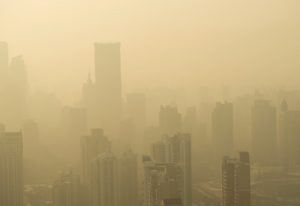
By now we know that air pollution is not only bad for the environment but also bad for our health. Scientific research has shown air pollution not only affects those who already have a respiratory problem – such as those with asthma – but it can affect healthy adults and children.
Evidence has shown that air pollution negatively impacts the lungs and can lead to nausea, chest pains, coughing and pulmonary congestion. Other research has shown elevated ozone levels lead to an increase in hospitalizations for respiratory problems.
The latest findings further support the negative impact which air pollution can have on health by linking it to heart disease as well as a higher risk of death.
Air pollution can lead to heart disease
Lead study investigator George Thurston said, “Our data add to a growing body of evidence that particulate matter is really harmful to health, increasing overall mortality, mostly deaths from cardiovascular disease, as well as deaths from respiratory disease in nonsmokers. Our study is particularly notable because all the data used in our analysis comes from government – and independently held sources.”
Fine particles can lead to the development of fatal heart and lung disease because they bypass the body’s defense system and get directly absorbed into the lungs and blood. They cannot be expelled from the body through coughing or sneezing like larger particles can and often contain worse chemicals than arsenic or selenium.
Data was evaluated from a health and diet survey which involved 566,000 males and females aged 51 to 70. Data was analyzed between 2000 and 2009, and researchers calculated risk of death from particle exposure cross-referenced with types of particular matter from the Environmental Protection Agency’s Air Quality System and other databases.
Particle matter exposure was linked with an increased risk of death and heart disease. Senior study investigator Richard B. Hayes concluded, “We need to better inform policymakers about the types and sources of particulate pollution so they know where to focus regulations. It is especially important to continue monitoring health risks as national standards for air pollution are strengthened.”
Preventative measure to help prevent heart disease and fight air pollution
- Always check air pollution levels prior to leaving your house.
- Use less energy in your home which can create more pollution.
- Avoid outdoor activities and exercising when air pollution is at its highest.
- Encourage schools to not allow buses to idle which can emit pollution.
- Walk, bike or carpool to reduce air pollution.
- Fill up your gas tank after dark – the sun turns gases into pollution.
- Don’t burn wood or trash.
- Use hand-powered electric lawn care.
- Don’t smoke or allow others to smoke indoors, and support smoke-free public areas.
- Learn about your local community policies and get involved in air pollution efforts to combat it.
If we all become aware of the harmful effects of air pollution we can begin to work together to reduce it. Air pollution is bad for the environment and for our bodies, so if we want to keep having a place to live – Earth – we need to treat it right and in turn it will treat us right back.